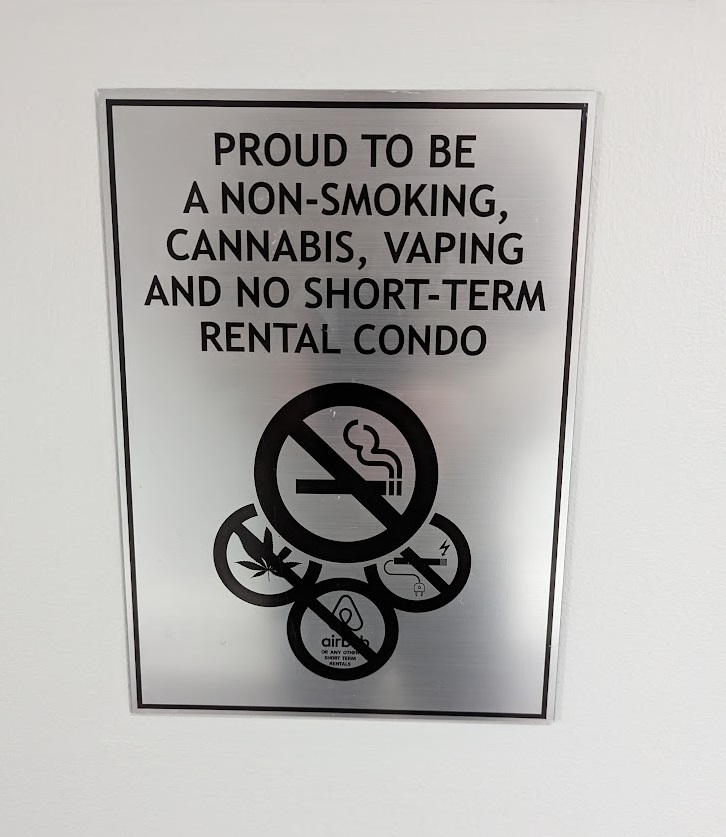In the bustling rental market of Ontario, landlords and tenants alike seek harmony and health within their living spaces. Central to this pursuit is the implementation of no-smoking clauses in lease agreements—a trend that has gained significant momentum in recent years. This article dives into the nuances of these clauses, offering a comprehensive overview of their legal standing, benefits, and enforcement.

No-smoking clauses are not just about preference; they are about creating a safe and pleasant living environment. For landlords, these clauses can mean preserving the quality of their property and mitigating potential conflicts among tenants. For tenants, it’s about ensuring a smoke-free living space, which is particularly crucial for those with health concerns related to secondhand smoke. Understanding the legal framework surrounding these clauses is vital, as it sets the stage for both parties to navigate their rights and responsibilities effectively.
As we unfold the layers of no-smoking clauses in Ontario’s lease agreements, we’ll explore their legal backdrop, the benefits they offer, the process of implementation and enforcement, and how to deal with exceptions and accommodations. This journey will provide valuable insights for landlords looking to update their lease agreements and for tenants seeking clarity on their rights and the living conditions in their rented spaces.
Legal Framework: Understanding Ontario’s Smoking Laws and Lease Agreements
In Ontario, the legal landscape surrounding smoking in rental properties is framed by a combination of provincial laws and municipal bylaws. This framework not only defines the legalities of smoking in private and public spaces but also empowers landlords to include no-smoking clauses in their lease agreements.
Provincial Legislation: The Smoke-Free Ontario Act, 2017, is a cornerstone in this area, prohibiting smoking in common areas of multi-unit dwellings. However, it doesn’t automatically apply to individual units or balconies, leaving room for landlords to make specific provisions through lease agreements.
Municipal Bylaws: Various municipalities in Ontario have enacted bylaws that further restrict smoking in certain areas. Landlords and tenants must stay informed about these local regulations as they can impact the scope of no-smoking clauses.

Here in Ottawa:
Ottawa’s Smoking and Vaping By-law: By-law No. 2019-241 in Ottawa is comprehensive, covering various public spaces. It prohibits smoking and vaping in enclosed public places, enclosed workplaces, outdoor restaurant and bar patios, and places like the ByWard Market stands, and Parkdale Market stands. This by-law reflects the city’s commitment to public health and is in line with the Smoke-Free Ontario Act, 2017. The enforcement of this by-law involves substantial fines for non-compliance, underscoring the seriousness with which the city views smoking regulation.
What landlords can do:
Incorporating No-Smoking Clauses: When drafting a lease agreement, landlords can include a clause that prohibits smoking in the rental unit and other specified areas. This clause must be clearly stated and agreed upon at the beginning of the tenancy. It’s important to note that for existing tenancies, landlords cannot unilaterally alter the agreement to include a no-smoking clause; this requires mutual consent.
Legal Validity and Human Rights Considerations: Such clauses are generally upheld in Ontario as long as they do not infringe on the rights outlined in the Ontario Human Rights Code. For instance, if a tenant requires smoking for medical reasons, landlords might need to accommodate this under certain circumstances.
Impact on New and Existing Tenancies: For new tenancies, landlords have the freedom to include a no-smoking clause right from the start. In contrast, implementing this clause in existing tenancies can be more challenging, often requiring negotiation and agreement from the tenants.
Understanding these legal intricacies is essential for both landlords and tenants. Landlords can effectively protect their property and ensure a healthy living environment, while tenants can be aware of their rights and the extent of restrictions imposed by these clauses.
Benefits of a No-Smoking Clause for Landlords and Tenants

No-smoking clauses in lease agreements offer numerous benefits for both landlords and tenants in Ontario, particularly in Ottawa with its specific smoking by-laws. These benefits contribute to a healthier, more harmonious living environment and can significantly impact the rental experience.
For Landlords:
- Property Preservation: Smoking indoors can cause significant damage to a property, including lingering odors, discoloration of walls and ceilings, and increased wear and tear. A no-smoking clause helps preserve the condition of the property.
- Lower Insurance Costs: Properties with no-smoking policies may be eligible for lower insurance premiums as they carry a reduced risk of fire and smoke-related damages.
- Attracting Tenants: A smoke-free environment is increasingly preferred by renters, especially families and health-conscious individuals. This can make a property more attractive to a broader tenant base.
Looking for a tenant for a rental property? Get in touch with us!
For Tenants:
- Healthier Living Space: Exposure to secondhand smoke is a significant health concern. A no-smoking clause ensures a smoke-free living environment, which is beneficial for all residents, particularly those with respiratory issues or allergies.
- Reduced Fire Risk: Smoking is a leading cause of residential fires. A no-smoking policy reduces this risk, providing a safer living environment.
- Community Harmony: Smoke-free policies can help prevent disputes between neighbors over smoking-related issues, fostering a more peaceful community.
Understanding these benefits can help both landlords and tenants appreciate the value of a no-smoking clause in their lease agreements. For landlords, it’s an opportunity to protect their investment and cater to a growing segment of health-conscious renters. For tenants, it’s about ensuring a clean, safe, and harmonious living environment.
Implementing and Enforcing a No-Smoking Clause in Ontario

Implementing and enforcing a no-smoking clause in a lease agreement in Ontario, especially in cities like Ottawa with specific by-laws, requires a clear strategy and understanding of legal boundaries.
Drafting the Clause: The no-smoking clause should be explicit in defining what constitutes ‘smoking’ and the areas it covers, including individual units, balconies, and common areas. It’s crucial for this clause to be detailed to avoid ambiguity and enforceability issues.
Communicating with Tenants: Effective communication is key. Landlords should discuss the no-smoking clause with potential tenants before signing the lease. This ensures that tenants are aware of the rules and the consequences of non-compliance.
Enforcement Strategies: Enforcement can be challenging but is essential for the clause’s effectiveness. Landlords should:
- Regularly inspect properties for compliance, respecting tenants’ privacy rights.
- Respond promptly to any complaints of smoking violations.
- Apply consistent consequences for violations, which may include warnings, fines, or, in severe cases, eviction proceedings, in line with Ontario’s Residential Tenancies Act.
Legal Challenges and Tenant Rights: Landlords must balance enforcement with tenants’ rights. Any action taken against a tenant for violating a no-smoking clause must be legally justifiable. Tenants also have the right to challenge an eviction or penalty if they believe it’s unjust.
Supporting Tenant Transition: For existing tenants who smoke, landlords might consider offering resources or support to help them transition to the new policy, such as information on smoking cessation programs.
Successful implementation and enforcement of a no-smoking clause not only enhance the living environment but also demonstrate a landlord’s commitment to maintaining a healthy and safe property.
Navigating Exceptions and Accommodations: What Tenants and Landlords Need to Know
In Ontario, particularly in cities like Ottawa with specific smoking by-laws, landlords and tenants must navigate the nuances of exceptions and accommodations related to no-smoking clauses in lease agreements.

Understanding Legal Exceptions: While a no-smoking clause is generally enforceable, there are instances where exceptions may apply, especially concerning human rights and medical needs. Tenants with medical conditions that require smoking or the use of cannabis for medicinal purposes may be entitled to accommodations.
Balancing Rights and Responsibilities: Landlords are required to balance the no-smoking policy with their duty to accommodate tenants under the Ontario Human Rights Code. This includes engaging in meaningful dialogue with the tenant to find a suitable solution that respects both the tenant’s needs and the rights of other residents.
Negotiating Accommodations: Potential accommodations might include allowing smoking in designated areas away from other tenants or improving ventilation in the tenant’s unit. The key is to find a compromise that minimizes the impact on other residents while respecting the tenant’s rights.
Documenting Agreements: Any agreement regarding exceptions or accommodations should be documented in writing. This ensures clarity and can prevent future disputes or misunderstandings.
Awareness and Education: Landlords should educate themselves about their legal obligations and the rights of their tenants. Providing information to tenants about the no-smoking policy, including the potential for accommodations, can foster a cooperative and informed community.
Navigating these exceptions and accommodations requires sensitivity, understanding, and a willingness to engage in open communication. By doing so, landlords and tenants can create a living environment that respects individual needs and the collective well-being of all residents.
A Breath of Fresh Air for Ontario Rentals

The incorporation of no-smoking clauses in lease agreements across Ontario, particularly in cities like Ottawa with their specific by-laws, marks a significant stride towards healthier living environments. These clauses not only protect the property and reduce potential conflicts among tenants but also contribute to the overall well-being and safety of the community.
Landlords play a crucial role in implementing and enforcing these clauses, while also respecting the rights and accommodations of their tenants. For tenants, understanding these clauses helps them appreciate the benefits of a smoke-free living environment and their rights in situations where accommodations may be required.
As society continues to prioritize health and wellness, no-smoking policies in residential rentals become more than just legal stipulations; they represent a collective commitment to a cleaner, safer, and more harmonious living space. In essence, these policies are not just about banning smoking; they are about fostering a culture of respect, health, and mutual consideration in the diverse tapestry of Ontario’s rental landscape.
